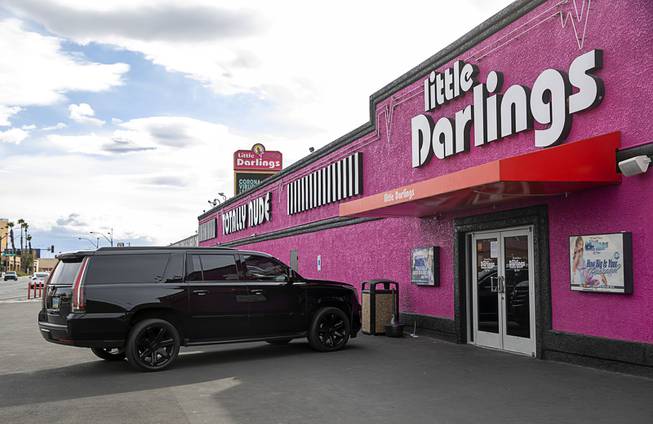
An exterior view of the Little Darlings adult entertainment club on Western Avenue Thursday, March 19, 2020.
Tuesday, April 21, 2020 | 2 a.m.
Like business operators throughout the Las Vegas Valley, Jason Mohney is trying to figure out how to support his employees amid the COVID-19 outbreak.
But unlike many, he’s facing a disadvantage in obtaining emergency funding from the federal government. Mohney is in the strip club business, which Congress lumps into a category of operations of a “prurient sexual nature” that have mostly been frozen out of the $2 trillion federal Coronavirus Aid, Relief, and Economic Security (CARES) Act.
The distinction is discriminatory toward a class of workers who perform a legal and legitimate service for the public, Mohney said, which is why he filed a lawsuit last week against the Small Business Administration, SBA Administrator Jovita Carranza and Treasury Secretary Steven Mnuchin on behalf of his company, Little Darlings in Flint, Mich., which operates 200 exotic dance clubs in Las Vegas and several other cities.
"We haven't been denied, just not given fair or consistent opportunities," Mohney said, referencing some clubs that were told their loan wouldn't be forgiven. "Some other clubs have been flat-out denied."
Small businesses would have been able to borrow up to $10 million in the act, which made $349 billion in low-interest loans available to those with 500 or fewer employees. The SBA forgives the loans if they are used to keep employees on the payroll for eight weeks, or if they are used for building expenses such as rent or utility payments. The program quickly ran out of money, but a vote on additionally funding is expected this week.
“The purpose of these loans is to give money for payroll from businesses to their employees, so to do something like this is just shortchanging the employees themselves,” he said.
So, like every other small business piecing it together during the closure, “we’re trying to keep costs down in each of the businesses and kind of keep things ready to go when we do open again,” Mohney said.
Mohney hopes business will pick up again once he’s allowed to reopen his clubs, but worries that fears around the virus will continue to linger.
“The biggest challenge coming out of this one I think is economically it’s not going to be easy, but the hardest thing is people’s comfort level being around strangers,” he said. “How long will it take for people to be comfortable around people?”
Early on in the shutdown, Mohney was creative in keeping his workers at Little Darlings employed by offering drive-thru peep shows. That attempt at staying open was quickly quashed when Gov. Steve Sisolak ordered Metro Police to enforce the shutdown order.
“As a country, we’re having some really important conversations about work and labor right now and it’s putting workers that perhaps have been marginalized front in center in our conversations,” said Lynn Comella, an associate professor of gender and sexuality studies at UNLV. “...(Adult industry workers) also have to pay rent or pay their mortgage or support their families or buy car insurance and food.”
In an unexpected twist, not all Nevada businesses in the sexual realm had their applications denied. Madam Bella Cummins, who owns Bella’s Hacienda Ranch in Wells, said she received a call from the SBA on late last week notifying her that her application for around $70,000 had been approved. There was one problem — by then, the program had run out of money.
But getting approved for the loan was a victory in itself, as she said a representative from Nevada State Bank initially told her not to bother filling out the application because she would be denied.
“It was a huge milestone because it’s the first time I was approved for anything associated with a grant or part of a package,” she said.
Cummins is optimistic that the effects from the pandemic will help the rest of the country see that sex work is legitimate work, and should be treated like any other business. “There is a small crack where the door isn’t closed now, and I’m excited about that,” she said.
